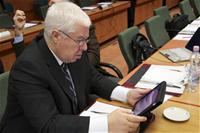80 billion euro for Portugal, Spain is out of danger for now
Ralitsa Kovacheva, Desislava Dimitrova, April 11, 2011
 Portugal will receive a loan of about 80 billion euro under a 3-year programme, containing measures for fiscal consolidation, structural reforms and financial sector stabilisation. This became clear after the meeting of EU finance ministers in the Hungarian town of Gödöllő, near Budapest. EU Economic and Monetary Affairs Commissioner Olli Rehn made the proviso that this amount was only an initial and approximate estimation. The real situation and financing needs of Portugal are yet to be analysed. A joint mission of the European Commission, the ECB and the IMF is to arrive in Lisbon on Monday to analyse the situation and to start negotiations on the adjustment programme.
Portugal will receive a loan of about 80 billion euro under a 3-year programme, containing measures for fiscal consolidation, structural reforms and financial sector stabilisation. This became clear after the meeting of EU finance ministers in the Hungarian town of Gödöllő, near Budapest. EU Economic and Monetary Affairs Commissioner Olli Rehn made the proviso that this amount was only an initial and approximate estimation. The real situation and financing needs of Portugal are yet to be analysed. A joint mission of the European Commission, the ECB and the IMF is to arrive in Lisbon on Monday to analyse the situation and to start negotiations on the adjustment programme.
A very important detail, highlighted both by Commissioner Olli Rehn and Eurogroup President Jean-Claude Juncker, as well as by ECB President Jean-Claude Trichet, was that the negotiations would include not only the caretaker Portuguese government, but also the parties currently in opposition. The aim is to achieve a cross-party support for a future agreement, so that it to be implemented, regardless of who would win the early parliamentary elections, scheduled for June 5.
“We call on all political parties in Portugal to swiftly conclude an agreement on the adjustment programme and form a new government after the upcoming elections with the ability to fully adopt and implement the agreed fiscal consolidation and structural reform measures,” a joint statement of the Eurogroup (the euro area finance ministers) and the Council of EU finance ministers stated.
The package of measures, proposed by the Portuguese government on March 11 will be used as a starting point of the negotiations. There is no way, however, it to be fully accepted since it hasn’t been approved by Parliament and led to the resignation of the government, Commissioner Olli Rehn reminded. "It is indeed essential to reach a cross-party agreement the programme to be adopted by mid-May," he said.
Although the details are still not clear, like what concrete conditions Portugal will  have to meet, it is clear that the programme will be based on three pillars:
have to meet, it is clear that the programme will be based on three pillars:
- An ambitious fiscal adjustment to restore fiscal sustainability;
- Growth and competitiveness enhancing reforms, including an ambitious privatisation programme;
- Measures to maintain liquidity and solvency of the financial sector.
There will be a specific allocation for the banking sector, Commissioner Olli Rehn explained. ECB President Jean-Claude Trichet was attacked by journalists with questions about whether the central bank had put pressure on Portugal to ask for external assistance, by forcing foreign banks to reduce their exposures to the  country. Some international media wrote that Portuguese banks had suffered by lack of liquidity and had also pressed the government to ask for EU help. Mr Trichet responded snappishly that the ECB had not forced anyone - neither the banks, nor the government - to do anything. He also declined to comment on ECB's decision to raise the interest rates for the first time since 2008 onwards by 25 basis points - from 1% to 1.25% - in the light of the recent events. This is another press conference, Trichet said.
country. Some international media wrote that Portuguese banks had suffered by lack of liquidity and had also pressed the government to ask for EU help. Mr Trichet responded snappishly that the ECB had not forced anyone - neither the banks, nor the government - to do anything. He also declined to comment on ECB's decision to raise the interest rates for the first time since 2008 onwards by 25 basis points - from 1% to 1.25% - in the light of the recent events. This is another press conference, Trichet said.
The ambition is the adjustment programme to be approved by the EU finance ministers at their meeting on May 16. According to Olli Rehn, a further 10 days will be needed by the rescue fund for the euro area - EFSF, to provide the necessary funding. The fund’s director Klaus Regling recalled the success of the first bond issue of the EFSF and expressed confidence that it would also succeed in raising the necessary funding for Portugal. The reason for the haste is that Portugal must make two big debt payments in mid-April and mid-June, and it is not known whether the country will able to pay. Olli Rehn assured that the immediate financing needs of Portugal could be covered.
Mr Klaus Regling explained that the markets had reacted positively to the Portuguese request for assistance and most of all, that the risk of contagion now was much less than 6 months ago. Mr Regling also pointed out that the situation had not affected the Spanish debt market. “Markets today understand much better the economic situations in different Member States,” Regling said. His comments were very relevant because the rescue of Portugal is shifting the focus of attention from the euro area periphery to the core.
First on the list of Member States that are carefully monitored by the markets are Spain and Italy. Analysts and media have commented that it is now that we would understand if the domino theory was true. Spain is the country that can confirm or disprove it, because the stakes are too high - its share in the euro area GDP is 10% (Greece, Ireland and Portugal have a total of 6%) and saving it would cost 500 billion euro, analyst Uri Dadush with the Carnegie Endowment wrote.
At this stage, the markets are calm regarding Spain, despite its huge public debt, the unemployment rate of 20% (the highest level in the EU) and the weak economic growth. The reason is simple: trust. Before the crisis the country has showed an example of fiscal discipline in the EU and has maintained low levels of debt and deficit. The enormous debt was accumulated in recent years due to the bursting of the property bubble and subsequent difficulties for the banking system. However, because of Spain’s “clean record”, unlike Greece, for example, the markets are confident that the adjustment measures and reforms, implemented by the government will prove successful. This trust indeed is lacking in respect of Greece. Therefore, although much more severe corrective measures have been implemented by the Greek government, expectations are growing that a restructuring of the Greek debt is inevitable.
In contrast to Portugal, Spain has met its target to reduce the budget deficit for  2010 to 9.3 percent from 11.1 percent in 2009 (although only at the central government level). The government has taken serious measures in terms of restructuring of the banking sector, especially of the savings banks - from 45 before the crisis, now they have merged to 17, Mr Dadush wrote.
2010 to 9.3 percent from 11.1 percent in 2009 (although only at the central government level). The government has taken serious measures in terms of restructuring of the banking sector, especially of the savings banks - from 45 before the crisis, now they have merged to 17, Mr Dadush wrote.
Now the big question is how much money the Spanish banks need to meet the capital requirements. According to the Spanish central bank the amount is 15 billion euros which amounts to 1.4 percent of the country’s GDP and is fully achievable. According to the Moody's credit rating agency, however, the total could reach 50 billion euros (nearly 5% of GDP). “It is worth noting that the trouble in Portugal could expose Spanish banks to about 80 billion euros in potential losses.” Uri Dadush noted.
Moreover Spain, unlike Greece, Ireland and Portugal, is systemically important for the euro area in terms of the banking sector, analysts with the influential Brussels think tank Bruegel wrote in a report, which euinside presented.
Indeed the answers of these questions we expect to learn from the new European bank stress-tests that must be completed by June. Additional risks to Spain ensue from ECB's decision to increase interest rates in the euro area to 1.25 percent, which could destabilise the Spanish property market, as well as rising oil prices on world markets, the analysis of the Carnegie Endowment said.
Although there are still too many unknowns at this stage, euinside shares the assessment that Portugal will be the last domino tile in the eurozone. One of the reasons for this view is that not all of the “ill” countries there are suffering from the same disease. The periphery has demonstrated weaknesses not only in terms of its public debt, but in its capacity to generate economic growth so as to overcome the debt problem. This is the biggest challenge facing Spain at the moment.
The second reason is that, although with some delay and hesitation, in the course of last year the EU has taken measures to address the debt crisis and to increase the economic coordination, which inevitably will have an effect. And once confined to the periphery, the “infection” will be treated painfully, but will not become an epidemic.
 Klaus Regling | © Council of the EU
Klaus Regling | © Council of the EU Mario Centeno | © Council of the EU
Mario Centeno | © Council of the EU Mario Centeno | © Council of the EU
Mario Centeno | © Council of the EU